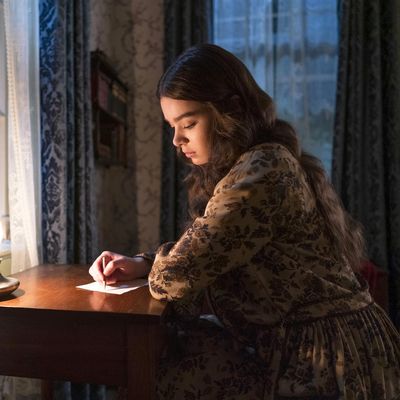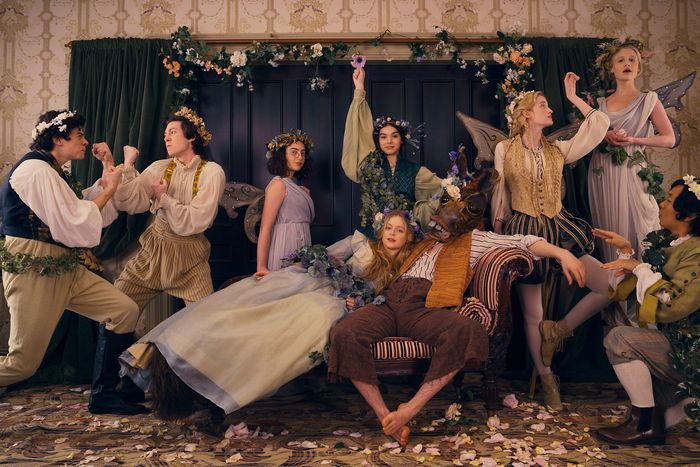
On a per-minute basis, Apple TV+’s Dickinson is probably the densest show on TV, in terms of a combination of literary references, a contemporary soundtrack, and scenes that can suddenly shift from hard comedy to poignancy. Balancing it all at the show’s center, there’s Hailee Steinfeld as the legendary Emily Dickinson herself, playing a brash young version of the great poet who alternately sulky and cutting and enthusiastic about throwing ragers. Dickinson is Steinfeld’s first TV show, after a movie career of attention-grabbing performances from her breakout in True Grit through The Edge of Seventeen and Bumblebee. In making the show, she relished the chance to dig deeper into a single character, as Steinfeld told Vulture over the phone. Along the way, she also found herself thinking about her own career, her fame, and even her approach to the music she makes.
I feel like Emily Dickinson, known late-in-life shut-in, would handle quarantine pretty well. Has playing her helped you get through all this?
In the beginning, it did. At this point? Not so sure. But I’ve had conversations with castmates and [Dickinson creator] Alena [Smith] about how Emily would’ve had no problem with this whatsoever.
Have you done any bread-baking? The bread Emily makes on the show looks so good.
I have not, but you’ve given me something to do now.
In the first season, the scenes that really stood out are those fights between Emily and her father, with you and Toby Huss facing off, especially the one where he slaps her and she disassociates and “goes to the circus.” What was it like to film that?
That relationship was one of my favorites to figure out. Having all 10 scripts at the beginning, I loved that I was able to see this clear arc, but the discoveries as we filmed kept happening. Toby and I had so many conversations that were fun to have and uncomfortable to have about that relationship, which is very loving and protective. It’s complicated and tricky.
Was there a moment where the relationship clicked for you?
I had a few, and luckily the first one came in the first episode, with the scene where the whole family is sitting around the table and Emily decides to announce that her poem is being published and all hell breaks loose. That was a moment I had on set with Toby where I feel like we really locked. The scene was rewritten a few times, and Alena was very particular with every word, and once we nailed it, that was definitely a moment.
Emily’s other defining relationship is with Sue Gilbert, played by Ella Hunt. They don’t even necessarily have the words to describe the love they feel for each other. How was it figuring out how to play that?
I don’t know how to describe how the dynamic was different to me than making a film, but because each episode felt like making a film, it felt like we had dug so deep. Ella and I were able to have the time to have these conversations, and I don’t know if I’ve had conversations with actors as I’ve had with this project. Ones where you set aside the time and sit down and discuss. Sue was somebody that saw Emily for who she was. A lot of people had all these opinions and preconceived notions about this person, and Sue saw through that. It’s a really beautiful relationship that happens to be between two women who just see each other.
What are those conversations like? What do you talk about?
It got really personal between the two of us, sharing how we identify with these characters in certain situations. And, you know, some actor-y conversations [laughs] that had to do with research and the history. But it was fun to be able to sit down and think about how we connect with these characters in today’s day and age.
I know Alena’s done a ton of historical research, but your job on the show is often to bring in those modern mannerisms and physicality. How did you approach doing that?
It became a matter of, first of all, knowing that this was our version of Emily Dickinson’s story. We knew it was different and interesting and funny and modern. Getting on set and being in period clothing. It was amazing to step into that world. If that were the situation I was in as a woman today, I would very much have Emily’s point of view on it all! The amount of physical constraints alone, let alone mental and emotional ones, on women was absurd. Just thinking of the reality of what some, if not most or all, women had to have been feeling at that time.
The show does a good job reflecting issues from the 19th century back to the present. Are there things from the contemporary world that you get into in season 2?
Season one was all about Emily making it very clear that all she wants to do is write, and going through waves of wanting the world to see her work and not caring about anybody seeing anything except for Sue, or even no one. In season two, we explore the idea of fame, what it’s like to be famous, how sometimes easy it can be to become famous, and some of the things we do to become famous. That was something that was interesting for me, as a 23 year old who has definitely… you know, we are part of a world where social media is prominent, and all of the access to fame is at our fingertips.
You’ve been famous since you were a teenager in True Grit. Were these aspects of fame that you were interested in exploring through the funhouse mirror of this show?
I definitely questioned a lot about myself and the position I’m in. I’ve never done what I do for fame, and it’s a very strange concept. To be able to dig into it through this funhouse mirror, there were moments where I had to be reminded of what was going on because I felt the parallels were merging too close together. I was very confused at times, and the benefit of that is that Emily is genuinely very confused at the beginning of season 2, trying to figure out what she wants.
How do you think about your own fame?
It’s a privilege to have a platform, and I feel lucky that I’ve been given some incredible opportunities. I’ve worked very hard for everything that I have, and I feel grateful for that. I don’t feel famous. It’s funny, these are conversations I had with people and myself while filming it. I get to do what I love, which is such a blessing, but unless I’m onstage and people are screaming my name or I’m on a carpet, it’s different. When I’m on set or making music, I get to disappear into a different world.
You’re pursuing both acting and music, which I imagine means you have to be pickier about the roles you have time to do. Something like Dickinson — a new show on a new streaming service with a very specific tone — feels like it could be a risk. What made you want to do it?
I had a conversation with Alena over the phone. She was in New York, about to give birth to her twins, and she took me through the full history of working on this, and it sounded so different. I was so intrigued and I read the first two episodes, and I was just like, This is amazing. There was part of me that didn’t necessarily understand it at first, much like Emily’s poetry, and there was something about that that made me want to understand it. I loved how different it was and how special it was. Music plays a huge role in the show, which was exciting to me. And launching a new platform for Apple, there were a lot of exciting elements to it.
Speaking of the music, you wrote “Afterlife” before doing the show, but modified it for the world of Dickinson. What’s that process like?
That song was done a couple of years ago, and we had conversations about possibly doing a song for the show. I had gotten back to LA after shooting season one and I was in my music mode. I got a call mid-week that was like “We need a song by the end of the week,” and I was like, okay! The sessions I was working on suddenly became Dickinson sessions. We did a couple songs that we couldn’t get finished in time to present, so I went back into a folder I’d had forever, and “Afterlife” was in there. It was weird how Dickinson-esque it was. As far as modifying it, we went back in on the verses and I took more detail from her poetry and the show.
You put out an EP Half Written Story this spring, and it feels like you’re at a moment of trying to push your own boundaries in music. Do you feel like there’s a connection between Dickinson and that?
I do. I didn’t realize it until halfway through working on the EP. I was working on the show, I had all of these things I wanted to talk about in my head and my heart, and the minute I got home to LA, I was in the studio. I made this decision to be 100 percent honest with myself. I realized, when I was wrapping up the project, that I always could’ve changed what I wanted, but I didn’t alter anything, and I really do feel like a lot of that came from having embodied this character that is fearless and truthful and talks about absolutely anything and everything that’s on her mind.



